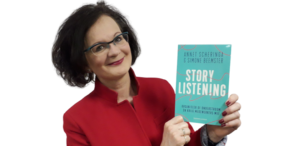
Why Storytelling?
Humans have always been storytellers, as we are social beings who seek and need connection with each other. Stories turned out to be very effective to achieve this, just as they are useful for the transfer of knowledge and for sense making. This, over time, has produced myths, legends, world literature and religious writings.
It has become increasingly clear why humans need stories:
This video from MSL Group again summarizes what the power of stories and storytelling is.
Why Business Storytelling?
As you can read in the adjoining texts:
- Stories make the abstract real and tangible.
Thus, stories can give meaning to abstract core values, an abstract strategic objective or an abstract vision and bring them to life; - stories have a huge capacity to connect.
Hence, stories can connect employees strongly to their organization and its objectives (employee engagement); they can help leaders to develop deep and meaningful connections with their employees (inspiring leadership); they can help to build strong connections between the outside world and the inner world of an organization (alignment), etc; - stories are very compelling.
So, stories can get employees to connect with (change) objectives, win clients for an organization’s products and services or put entrepreneurs and companies firmly on the map; - stories help us to remember, learn and share knowledge.
So, stories play an essential role in training, education and knowledge management; - stories are about humans.
So, wherever people matter, stories matter;
Stories are told everywhere and by everyone. Those who listen to the stories gain valuable insight into experiences, perceptions and emotions of people: the undercurrent. Therefore, storylistening is at least as important as storytelling. That’s why we believe storylistening should always preceed storytelling.
We’re proud our most recent book on Storylistening is selected to be among the top-5 managementbooks of 2021 in The Netherlands!
TheStoryConnection is expert in the field of Business Storytelling & communication, leadership and change.


